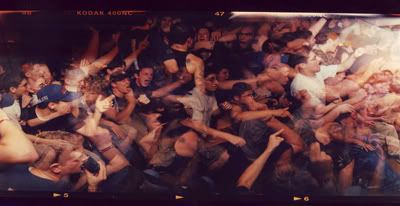
Brian Peterson is the guy behind the forthcoming book on Nineties Hardcore, entitled Burning Fight. We wanted to catch up with him to get the scoop on this book and what we can expect. -Gordo DCXX
Tell us a bit about yourself and how you got into hardcore. Where and when was this? How would you compare yourself today to the kid that got into hardcore then?
Okay, well, I'm 32 years old. I'm originally from a small town called Minot, North Dakota, but then I moved to Illinois when I was in high school. Dylan, a childhood friend from Minot who was a skater and all around underground music fan, introduced me to hardcore in junior high, but at the time I was obsessed with hip-hop. I've always been attracted to music with a message and listening to Boogie Down Productions, Public Enemy, Eric B. and Rakim, Big Daddy Kane and others was a pretty eye-opening experience, especially for a kid from a small town in the middle of nowhere. Anyway, I understood the energy of hardcore, but I just wasn't ready for the screaming at first. [laughs] But after listening to a couple mix tapes, some of the bands made an impression on me—especially after I found out what they were screaming about! My family moved to Illinois when I was about 15 and by then I'd already gotten into Nirvana and then more contemporary hardcore or punk influenced bands like Fugazi. From there I got re-introduced to the classic hardcore bands that Dylan introduced me to like Black Flag, Bad Brains, The Misfits, Minor Threat, Youth of Today and so on. It's funny, though, as I didn't even realize there was a thriving hardcore scene happening at the time. I guess I had thought it was all from the past, probably because most rock journalists viewed hardcore or punk as "dead," even though that was really because they weren't truly paying attention to the underground. A friend in Illinois made me a mix tape with some contemporary hardcore bands and soon enough I found myself at shows and not too long after playing in some hardcore bands. My life would never be the same.
As for comparing myself at present to the kid who got into hardcore, I've matured a lot. I was a pretty shy kid, and I didn't feel confident in myself. But hardcore taught me to take my own ideas more seriously. Sure, there are negative sides to the hardcore scene, but I've always found it to be a pretty supportive and encouraging place. I'm now a high school English teacher and if someone would have told me when I was younger that I'd end up in this position now I would have thought they were crazy. [laughs] But that's another thing about hardcore: it taught me that giving back to others – whether it was friends from the scene or strangers on the outside – was important. I could also say being a part of hardcore was like going to college before and while going to a traditional college. I learned as much about life and about myself from my time in hardcore than I did from anything else.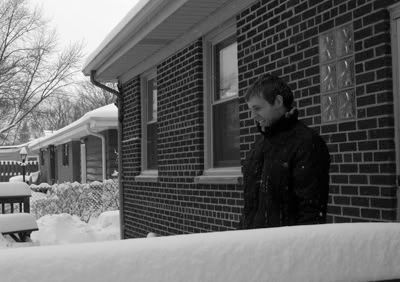
Brian Peterson braves the snow
Where did the idea for the book come from, and specifically a book on the 1990's era of hardcore?
I didn't get directly involved in hardcore until the early-nineties, so that era had a huge impact on my life. As I mentioned earlier, I've always been attracted to music with a message and almost every hardcore band I was exposed to had some sort of message, whether it was political or personal. I also found a lot of the debates and discussions I'd overhear or participate in at shows to be really interesting. While some of the debates – everything from straightedge and animal rights to political and spiritual/philosophical issues – were sometimes taken to absurd levels, I found the ideas to be relevant and important.
Fast forward several years. American Hardcore came out and I thought that book was really amazing. It had such great source material from all those classic bands and it was an entertaining read. But something troubled me. The author insinuated that hardcore died around 1986 and that idea floored me. Sure, that first wave of hardcore moved on around that time, but what about the bands that came after? Nineties hardcore changed my life, as well as the lives of many of my friends. I guess I felt like it was somewhat ignorant to say that hardcore "died," considering that it is still thriving to this day. Along the way, I had written for some zines and magazines, but I grew tired of many places only wanting to run stories on bands with a "buzz"—essentially groups most other publications were covering already. Anyway, an idea occurred to me one day, "No one has documented nineties hardcore in the way the eighties era has been. Maybe I should give it a shot." I started contacting some people for interviews and I found their responses to be really positive and enthusiastic. Everything just snowballed from there.
How have you approached the subject matter? Where do you draw the line, what gets in and stays out? Especially considering the musical definition of "hardcore" is considered by many to have been stretched to its limits if not completely ignored in this decade, defining a "hardcore" band in the 90s seems like it would be difficult for the purpose of a book, no?
There are so many ways to approach hardcore. The nineties era is no different than any other era in that respect. I'm not trying to "define" what nineties hardcore was on the whole. I've always stated up front that this is just a story about some debates/ideas and some bands told from some people's perspectives. 100 other people would probably write the book 100 different ways. There is no definitive definition of hardcore as I believe that each person has to define it for him/herself. That said, I think one of the most interesting parts of nineties hardcore was the diversity in ideas and sound. Now obviously there are lines that have to be drawn in terms of what hardcore's sound isn't. For instance, I don't see an acoustic jam band fitting the hardcore mold. At the same time, I don't think that hardcore has to necessarily have break downs or traditional sing alongs, as great as those things are. I tried to cover a variety of bands that spoke to a variety of issues and played a variety of styles of hardcore – from the traditional to the experimental. Some will disagree with some of my selections, but I think once people see the book (or even look at the full title of it) it will make sense. I agree, though, that the nineties did stretch the sound of hardcore to its limits, and like I said earlier, to me that's one of the most interesting things about that era. I love traditional sounding hardcore, but I guess what I'm trying to say is that hardcore is just as much about community, ideas, and ethics as it as a specific sound.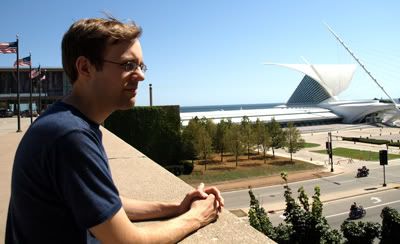
Brian in Milwaukee, 2008
What have been the highs and lows of doing the book? If you knew what you were getting yourself into, would you have still started it? What have been some crowning moments or big breakthroughs?
The highs from the book? Being able to give some attention to these bands, people, zines, and debates that played such an important role in my life. I've felt like a lot of bands from this era have been overlooked for too long, so I hope that what I'm trying to do helps re-focus some attention in this era's direction. It was also really cool to hear so many people's perspective on the issues I'm trying to cover. Lots of really interesting conversations transpired. Lows? Well, I never thought it would take five years to assemble this book. I've spent a pretty outrageous amount of hours interviewing people (I talked to over 150 people over the course of the book) and in some ways I feel like I've had to put other aspects of my life on hold in order to finish it. I've learned more about sacrifice, time management, and multi-tasking then I probably ever wanted to know. [laughs]
Where are you right now in terms of the book, and what happens from here on out?
We're still wrapping up final edits and layout at this point. Revelation has been extremely supportive and helpful and I'm really excited about the way everything is turning out. Plus, a lot of people from the nineties have been generous enough to donate pictures, flyers, zine covers, etc. Rose Noble, the person doing the layout, is doing a really great job, and I'm stoked to see the finished version! We don't have a definite release date yet, but obviously the Chicago show on May 2nd and 3rd is the date we are shooting for. There is also a California show in the works. Stay tuned for an announcement about that soon at www.burningfightbook.com and www.myspace.com/90shardcore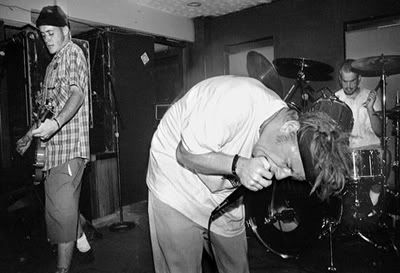
Groundwork, Photo: Sean Capone
Wednesday, January 7, 2009
Brian Peterson - The Burning Fight Nineties Hardcore Book
Subscribe to:
Post Comments (Atom)

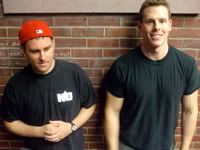
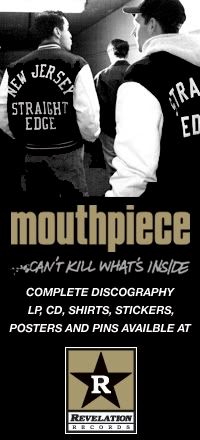
18 comments:
yes!!! finally someone decided to do a book on 90s hardcore. i really love the american hardcore book but that just covered the classic early stuff, wat abt the 90s/second wave stuffs??can't wait to get my hands on this one for sure...
This is rad. The 90s hardcore scene had so many great aspects. I think every show was a benefit for something, the songs were positive and it was a great moment in time.
American Hardcore is a good movie and all, but it really glorified too much of the perceived danger of hardcore.
Thanks for writing the book Brian.
-Joe
am coming from australia for these book release shows. cannot wait!
Sounds like a horrible book
90's is the decline of hardcore but it's still great.
There are so many great bands that were left out of that radio silence book, hope this book includes bands that were left out. Somehow I doubt it, there's research, and then there's RESEARCH.
Heard the show in May should be good.Unbroken, Killing Time, Underdog, A Chorus of Disapproval? Tell me it's true, please? Some of the greatest 90's hardcore bands of all time. To bad it's sold out. Cant get tix. Fuck.
I hope the book does not say that hc died in 95, you know what I mean!
there was a youth crew revival in 97 and I pray that it´s covered in this book.
was the post right above this actually serious?
Even though I grew up on '80s hardcore, I didn't start going to shows or becoming actively involved in the scene until the early '90s and I can say with absolute certainty that it was a FANTASTIC time to say the very least. Kudos to you, Brian, for documenting it.
90's Hardcore?? Wow can't wait to here all those Earth Crisis stories. Think I'll pass.
Will this book be made available to purchase as a PDf download?
Anonymous guy ......Can't wait to "here"? or "hear"?
Even though a lot of us grew up on 80's hardcore, there is no reason to dismiss 90's hardcore. In ten years people will look back on the 90's underground music scene in the same nostalgic way we look back on the 80's. Even though the 90's brought a lot of independent music to the mainstream, a lot of this music has value, and it's not like it was the total end of the basement or VFW show. I will be the first to admit that I wasn't happy with the influx of chug/jock/mosh-metal in hardcore during the 90's, but there was so much great stuff happening at the same time, as other bands began to experiment more and more.
Nelson, here/hear guy is obviously dyslexic which is why he's gonna pass on reading this book, ya doof.
brian!
long time, duder. is Beert the friend who made you that original mix tape? kudos on the book, and hello again.
The author Brian Peterson is my writing teacher. His book sounds really great ima have to get him to sign my copy :]
BRIAN PETERSON IS MY WRITING TEACHER ^_^ WE ARE ALL SO PROUD OF HIM hehe :]
Very helpful piece of writing, much thanks for this article.
Post a Comment